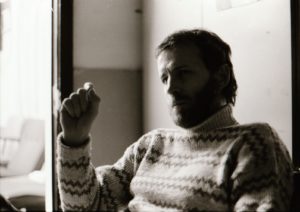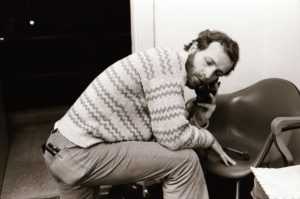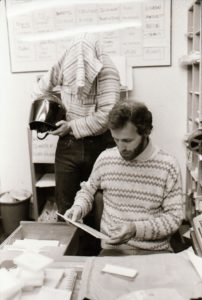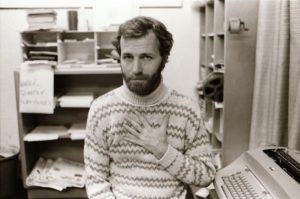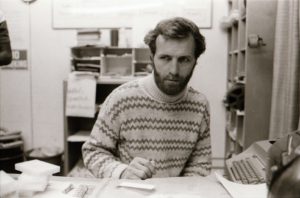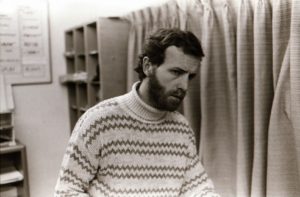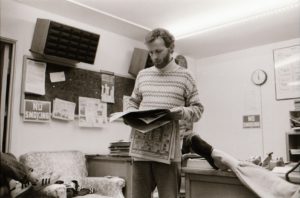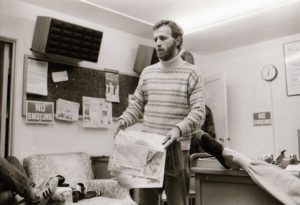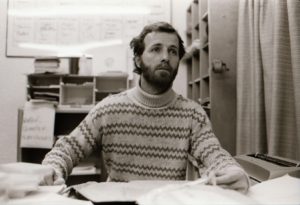Gary Kern on KUCR’s 50th Anniversary
Gary Kern
LETTER TO FELLOW RADIO PERSONALITIES
GREETINGS, KUCRIANS. Sorry I can’t be there. I’m trapped in a little desert town in New Mexico: Las Cruces. I had to move here when the housing bubble was expanding and my rent went up $250 a month. Couldn’t afford it, couldn’t find an affordable place to rent in Riverside for self, wife, cat and dog, plus tons of books, CD’s and LP’s. Discovered I could get full financing on a house, but the average house in California in 2006 was $500,000, and in Arizona the same. Next state: New Mexico, nice houses for under $200,000. We found one, thirty-year mortgage. We’re paying on it, but the value is going down faster than the amount we owe. It’s upside-down. As in many other cases, the Land of Enchantment became for us: the Land of Entrapment.
Here’s a piece of advice for when you retire. Don’t go to a picturesque little town, no matter how highly recommended by the experts, travel magazines and such, unless you have some person or some institution there to receive you. If you’re like me, every time you have moved in the past it has been to a spot where you had somewhere to go: to the university, to a place of work, to a study program. This spot gave you a way to meet people, to get integrated in the town, to develop a sense of belonging, even as a loner. Without a connection you have to try to make friends cold, to insert yourself unwanted into the university, to make conversation with a supermarket cashier, to take the standard send-off “Have a wonderful day!” as your daily punishment. In short, you can go for ten years trying to make connections and still remain a wandering stranger in a strange land. And, to make it worse, only you know that you’re a stranger. To put it another way: In the land of the blind, the one-eyed man is not seen.
So plan carefully. Before anything else, I want to put out a blanket apology to all the people I met and worked with at KUCR. If I made a wrong move somewhere, offended you, failed to do something I said I would do, screwed up your show by running late on my own, or by popping into the control room with some brilliant idea, said a lot of things you didn’t want to hear, and so on and so forth, and you still remember it with exasperation, forgive me. I was a stupid jerk, a maniac, a zealous spy-hunter, a worshipper of Bach, Beethoven, Bartok and all the other B’s, and a seeker of the light in a tall glass of Bass Pale Ale. Budweiser, my friends, is an insult to the serious beer drinker! But now I am clean, don’t drink, don’t smoke, and all other the good things. Now I’m old and wise.
In other words, it’s the same delusion as before: it was the guy ten years ago who was the idiot. And don’t you think the same thing about yourself ? The funny thing is that for physical appearance, it’s the other way round. If you took a selfie today, or had a photo taken, a really bad one, keep it. Ten years from now it’s going to look very good. You’ll wish that you looked that good. You’ll wonder why you didn’t get more action looking that good. Anyway, I’m sorry.
So KUCR. Tempus fugit. Recently I checked the spelling of this axiom, my septuagenarian memory being somewhat uncertain, and discovered that the complete phrase is Fugit tempus inreparabile. That is, in-rep-par -ah-bill-lay: irreparable, irretrievable. “Irretrievable time flies” ? that’s the axiom. And earlier than Virgil the great Greek Heraclitus uttered the phrase that encompasses all existence: Panta rhei (pahn-ta ha-ray-ee) ? all things flow. That is, all things change. And therefore: “You can’t step in the same river twice.” Both you and the river change.
So the ancients had it all figured out: Everything changes, you can’t hold it back, you can’t control anything, everything will be obliterated. Wisdom consists in recognizing this fact and finding your happiness in the fleeting moment, in the here and now. And this is precisely what mankind does not do: it wages war with the obliterating universe, tries to hold back words, thoughts and sounds ? by memory, engravings, musical notation, recordings, playback systems. Radio is part of this heroic and doomed defiance of the human spirit. It shares the moment on air, records that moment, later retrieves it and plays it again. And then all the transmission and recording systems are attacked by the elements, but we repair them, change them and go on.
Louis, Bill Elledge and I used to talk about the radio personality, a very curious breed. You want to speak to others, to reach out and to share what you love, and you want to do it from a distance, maybe at night, in the dark, unseen. You want your voice, your music, your witty remark to go into the ear of the listener as if you were up close, speaking intimately. And above all, even if you don’t say much, and give almost all the time to the music, you want what you say to be you ? not some prefabricated crap that some committee has decided, not some dreary print-out from a central office, not standard pap. Radio, if it is honest, gives you the chance to be yourself to another. It’s almost what the beautiful girl wants: Do you love me for myself? Would you love me if… and so on. Radio, in a way, gives you a chance to be loved for yourself, because, you know, actually you’re not there. And the listener can imagine all sorts of things from your voice, but if he or she likes you, then they really like the essence of you. It seems almost spiritual. And of all the radio stations that I have ever heard or been involved with, KUCR most allowed and hopefully still allows the person on air to be him or herself, to be an honest broadcaster. This is a wonderful thing in the wretched world today.
Among all the talents that Louis possesses, not simply the knack of picking up a rattlesnake by its tail and tossing it in an empty trashcan, meanwhile laughing and dancing in his driveway, as I had occasion to observe and hereby testify to one and all, he has the ability to see the radio personality lurking in the student, sometimes shy, sometimes overly bold, applying for a spot at the station. I have seen young people blossom at KUCR, beginning their programs nervously, uncertainly, gaining assurance, then mixing things up, making innovations. Once the basics are learned, the radio person wants to play. And within the bounds of the FCC rules, of course, Louis lets them play.
That’s how KUCR put out fantastic shows that couldn’t be matched anywhere else: alternative rock, of course (which I learned to like), but also something like Robert Levine’s industrial music show: the sound of factory machines and groaning workers howling through the boiler rooms of Fritz Lang’s “Metropolis” ? not just for three minutes, but all through the night, six or eight hours of clanging, screeching, revolving, evolving factory rhythms. Beautiful! Unbelievable! Or Robert Kreutzer’s blues show: “Now,” he said, “we’re going to do fast blues,” and I heard what I had never heard before ? fast blues, more fast blues, more fast blues. The whole show. Fast blues. Fantastic! Or how about Diane’s live afternoon production, with local actors, of “The Christmas Tale” ? with sound effects, tea cups, closing doors, tinkling bells, no less! And permit me to mention myself playing three turntables at one time: Brian Eno ambient music on TT1, screeching door and other sound effects on TT2, Kate Bush or Cocteau Twins on TT3, with me turning the dials up and down and mixing. It was live, and it worked.
I’m starting to remember shows and better stop, because there are too many and I’ll leave people out. Louis brought Oscar Brown over to the station to do a series of jazz shows, reading his witty poems, sometimes singing over a recorded musical track, mixing things up. “Ladies’ Man” ? remember that? The sly intonation he put on it? The jazz professors ? the best jazz shows on the air, anywhere. Louis and Wally doing real car talk, not just haw-hawing like some other car guys I won’t mention. We interviewed professors, politicians, celebrities, Jerry Brown, Eldridge Cleaver. I did some readings with musical insertions: The Epic of Gilgamesh (together with Janis Overlock), stories of Kafka, essays of Schopenhauer, memoirs of Shostakovich. We had all the best orchestras sending us weekly concerts for free: The Los Angeles Symphony Orchestra, the Chicago Symphony Orchestra, the Milwaukee and so on. Andreas Johns, then a very young student, a teenager, did an incredible show of Eastern music ? and he played gongs and xylophones in a gamelan ensemble, so he knew what he was talking about. We were ahead of the curve in these and many other things, like minimalist music, for example.
The combination of a small professional staff, student interns (knowledgeable in their field) and student volunteers free to develop and explore made for a lively and real radio experience. You might turn on KUCR and not like what you hear, I used to tell people, or let’s face it, you might really hate what you hear, but if you return, at some point you’ll hear something you do like and it will be something you won’t hear anywhere else. Then you will be hooked. I think it was a great experience for most students, a colorful addition to their academic program, and the danger was that they would like it too much and not stick to the books. Contrariwise, the confidence students developed in front of the mike must have transferred at times to the classroom. As they used to say about karate, training builds character. It’s true. And so the station really did perform its service as a student activity and prove itself a necessary part of the university.
I’ll toss out a few memories and then conclude. Sometime back in the ‘80s or 90s, the station’s existence was threatened by a religious station that applied for a permit to broadcast from the area of Mt. Palomar with a signal that would wipe out our own in Riverside. Louis and I drove out to the area to snoop around. Louis was baffled: to whom would this station actually broadcast out here in the wilderness? It was evening, growing dark; there was nothing around but pine trees, bats, and we were on foot. Louis approached a ridge. Then he started laughing, yelling and pointing: “There it is! There it is!” I ran up to the ridge. Below ? rows of lights, houses, streets: the outskirts of San Diego lay before us.
And, indeed, there it was: the competing station’s application was a fraud; they claimed that they wanted to serve the area of Mt. Palomar, but really wanted to flood the already flooded San Diego market with religious programming, meanwhile blowing us off the air. In the months that followed, Louis had to work with a media lawyer in Washington DC to stop the threat and save the station. Really big, high-powered stuff was needed to save what appeared to be only little white boxes with a big antenna, a Class D station that, when I started, only broadcast across the street to the dorms. And after that threat, of course, KUCR for its own protection had to get upgraded to Class A. The huge project was handled by Louis and Bill, driving his truck up Box Springs Mountains nearly every day, around and over boulders big and small, as if we were going on safari. In my memory it’s an early technicolor movie about progress.
All the same, tempus does fugit. That’s with a hard g ? fugg-it. And so a radio station, a theater, a university has to become an institution and pass on the tradition to others. That’s a way of fighting the ever-flowing river. While I was there the waters gushing toward us ? and speeding up ? carried away a number of friends at the station, every one too soon, every one a terrible loss.
Seth immediately comes to mind ? his face, his kind manner, his trust that when he stepped out on a crosswalk the cars would stop. They did stop in front of Bannockburn, I was with him, but not on the streets of Paris. There’s no way to repair, to retrieve, except by memory and a few letters.
Bill Sandstedt, always a lively, somewhat wild guy. He worked as KUCR cleanup man for awhile. I always felt a kinship in the sense of being never quite in place, more out of place in most places. He had a lot of theories about things, but always said them with a laugh, as if everyone already knew them to be true.
The tall and genial lawyer whom I didn’t know so well but remember as George McC; he told me in his soft voice (affected by his bad heart) how people could make money out of non-profit organizations. I can hear his soft chuckle over that one.
And Bill Elledge, there at the beginning, but never taken quite seriously for so many years; he seemed such a character with his elderly manner, his rolling voice and his old-fashioned ways. But in the last year, 2006, I was preparing to leave Riverside and was coming into the station in the evenings to make recordings to take with me out into the unknown desert. So I saw a lot of Bill, who often did his work through the night. Then I made my first attempt to befriend him, because I had lost my older brother and needed a brother, and I think I knew I was going to miss Bill. He was younger than I, but always acted older; and now I let him do it, and found that I had wasted years with my casual attitude toward him. I discovered all too late that if you were up front with Bill, there was no better friend in the world.
The rushing waters! What can we do? For me, Beethoven gave the best answer. On his deathbed, he rose up at a streak of lightning and raised his fist to the sky. Commercial radio, including PBS, has just about succeeded in domesticating Beethoven. But let’s hope that the fierce spirit of defiance to fate can somehow, somewhere persist. We’re all in the same boat. I miss you all, especially Dee, and even those I’ve forgotten, who show up in dreams. Panta rhei.
5 October 2016
Photographs of the author taken at KUCR by Bill Elledge, ca. late 1970s-early 1980s. From the KUCR Archives.
